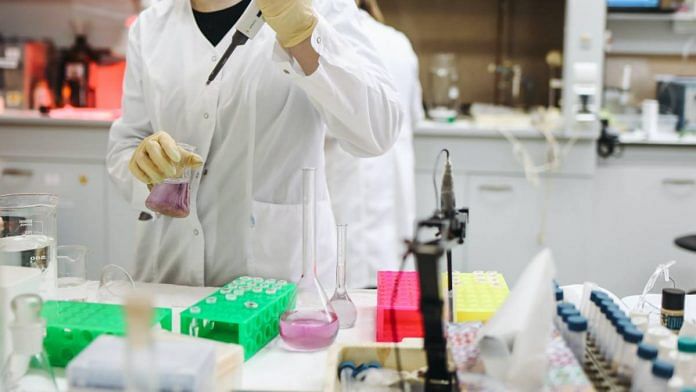
New Delhi: In order to ease pressure on the Kasauli-based Central Drugs Laboratory (CDL), the Narendra Modi government has started the process of developing two new testing laboratories for vaccines — at the National Centre for Cell Sciences (NCCS) in Pune and the National Institute of Animal Biotechnology (NIAB) in Hyderabad.
Currently, CDL is the only such laboratory in the country. With a slew of new vaccines against Covid-19 expected to become due for clearance in the coming months, pressure on the Himachal Pradesh facility will only go up. This is why the Department of Biotechnology (DBT), which comes under the science and technology ministry, has zeroed in on two other locations to build vaccine testing facilities.
“The two sites have been carefully chosen. Hyderabad and Pune are the two vaccine hubs of the country, that is why we will have two new labs at these two locations,” a senior government official told ThePrint on the condition of anonymity. Currently, the two vaccines in the national programme, Covishield and Covaxin, are being manufactured in Pune and Hyderabad respectively.
ThePrint had last week reported that NCCS was undergoing inspections — by the state drug controller’s office, the apex drug regulatory authority the Central Drugs Standard Control Organisation, and the CDL — as part of the government’s plan to authorise it for testing Covid-19 vaccines.
ThePrint reached DBT Secretary Renu Swarup for a comment via phone calls and WhatsApp but there was no response till the time of publishing this report.
Besides being the only government-authorised laboratory in India that checks safety and efficacy of vaccines available in the Indian market, CDL is also the only lab in the country approved by the World Health Organization (WHO) to test vaccines that are being exported by India to 170 countries across the world.
Since January, when Covid-19 vaccines were launched in India, up until 14 June, the CDL cleared more than 37 crore vaccine doses. These include 32 crore doses of Covishield, 3.94 crore doses of Covaxin and 1.5 lakh doses of Sputnik V.
Surge in Covid-19 vaccines expected
Through June, India is expected to have a total supply of 12 crore Covid vaccine doses. Between August and December this year, the government said it is expecting 216 crore doses to be available. Although these estimates have been met with cynicism, officials say there is no doubt that vaccine production will go up several fold, which is why the country will need to prepare facilities to handle the increased load.
Among the Covid-19 vaccines that are expected to come into the country in 2021 are mRNA vaccines of Pfizer and Moderna, DNA vaccine of Zydus Cadila and the protein subunit vaccine of Biological E, a nasal vaccine from Bharat Biotech and an indigenous mRNA vaccines from Genova Pharmaceuticals.
Sources in the government say that the laboratories are expected to be up and functioning in the next “one to two months” and are being funded by PMCares, the Covid relied fund Prime Minister Narendra Modi set up last year to help tackle the pandemic.
“We are only getting ready now and for us right now the priority is to sustain the pace. We will wait for it to get completed and then report to the Department of Biotechnology before issuing a statement to the press,” Dr Manoj Kumar Bhat, director NCCS told ThePrint.
Dr Subeer Kumar Majumdar, director NIAB, refused to comment on the upcoming facility at his institute when ThePrint reached him via phone.
Senior government officials explained that the construction of the laboratory is a very “complicated process”, which is why the government is treading cautiously.
“You have to understand that neither of the two institutes have experience of doing this. Also these kinds of things need time and caution. There are inspections at every step of the way to ensure full compliance,” an official told ThePrint.
(Edited by Manasa Mohan)
Subscribe to our channels on YouTube & Telegram
Why news media is in crisis & How you can fix it
India needs free, fair, non-hyphenated and questioning journalism even more as it faces multiple crises.
But the news media is in a crisis of its own. There have been brutal layoffs and pay-cuts. The best of journalism is shrinking, yielding to crude prime-time spectacle.
ThePrint has the finest young reporters, columnists and editors working for it. Sustaining journalism of this quality needs smart and thinking people like you to pay for it. Whether you live in India or overseas, you can do it here.